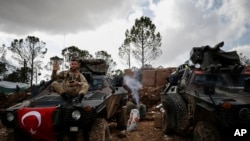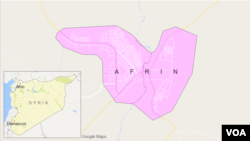Amin Murad Manan recently received a phone call that he had been expecting since fleeing his native city of Afrin in 2018, when the Turkish military and its Syrian proxies invaded the Kurdish-controlled territory in northwestern Syria.
"The call was from my cousin, who still lives in Afrin, telling me that my family's agricultural land was now being turned into a settlement for Arabs from other parts of Syria," he told VOA in an interview.
Manan, 59, has been living as a displaced person in Qamishli, a Kurdish-majority city in northeastern Syria controlled by U.S.-backed Kurdish forces.
The Afrin district came under the control of the Kurdish People's Protection Units, or YPG, shortly after Syria's civil war erupted in 2011. But Turkish forces and allied Syrian proxies carried out a major offensive in 2018 and successfully ousted the Kurdish group from the region.
The Turkish government views the YPG as an extension of the Turkey-based Kurdistan Workers' Party, or PKK, which Turkey, the United States and the European Union consider a terrorist organization.
Since Turkey took control of Afrin, rights groups and Kurdish activists have accused the Turkish government and its allies of changing its demographics by settling Arab and Turkmen families in the predominately Kurdish region.
Last week, Turkish-backed groups in Afrin announced the opening of a new settlement that will ultimately have 200 residential units for displaced people, Syrian opposition news sites reported.
Manan said the 10 acres on which the so-called Ajnadeen village is built belongs to his family.
"This land has been owned by my family for generations," he told VOA, adding that "official Syrian government records prove that this is our land."
"When my cousin asked the groups that are currently ruling Afrin why they were building on a land that belonged to other people, their response was, 'We've seized this land because it belongs to the YPG.' "
Palestinian backers
The settlement in question was named after a Palestinian humanitarian organization that funded the construction project.
"We do humanitarian work, and we are not aware of complex political matters inside Syria," said Mohammed al-Khalid, a project manager at the Ajnadeen Charity group, based in the Gaza Strip.
The organization last week published photos on its website, describing the inauguration of the first phase of the project in Afrin.
"This land is for all Syrians, no matter who they are or where they come from," al-Khalid told VOA, adding that "what matters to us is alleviating the plight [of Syrians] as much as we can."
He said his group doesn't "discriminate between Kurds and Arabs, or Sunnis, Shiites and Alawites."
Nazmi Hazouri, the Palestinian consul general to Irbil, the capital of Iraq's Kurdistan Region, on Tuesday told Kurdish news network Rudaw that the funding of such projects by a Palestinian group doesn't reflect the official position of the Palestinian Authority.
"There is no official Palestinian project to build residential complexes in Afrin or any other part of Syria," he said. "Some religious organizations have been using the name 'Palestine' in these projects."
In September, the Palestinian Authority's Foreign Ministry issued a statement denouncing the construction of Palestinian-funded settlement projects in northern Syria.
"We will not accept infringing the rights and properties of Kurdish families in Afrin and other Kurdish areas in northern Syria," Riyad al-Maliki, foreign affairs minister of the Palestinian Authority, said at the time.
Turkey blamed
Legal experts have blamed Turkish authorities for allowing such settlement projects to take place in Afrin.
"These local and international aid groups that are involved in building these settlements have open ties with the Turkish government, so they have the approval of the Turkish government," said Bassam Alahmad, executive director of Syrians for Truth and Justice, a Paris-based advocacy group that documents rights abuses in Syria.
"As an occupying force, the Turkish government is legally responsible for what happens in Afrin, including these illegal settlements," he told VOA.
VOA contacted Turkey's Foreign Ministry regarding this matter but has received no response.
Turkish officials, including President Recep Tayyip Erdogan, have said that Turkey supports the building of residential units in northern Syria that would allow some Syrian refugees in Turkey to return home. According to the United Nations, Turkey has hosted about 3.5 million Syrian refugees since the beginning of Syria's conflict in 2011.
Metin Corabatir, president of the Ankara-based Asylum and Migration Research Center, told VOA that small numbers of Syrian refugees have been resettled in northern Syria.
"These are areas with mixed populations, so in addition to Kurds, there were Arabs there before the war, and some are now returning to their homes," he said. "So I don't think there is a general ethnic cleansing taking place in northern Syria.
"Some people left when the Turkish military took control of these areas, but it is not the entire population, and I don't think this is an ethnic cleansing type of situation."
Manan, the displaced man from Afrin, said that while he could not return to his hometown because he feared retribution from Turkish-backed groups, he would not give up his ownership rights to his land.
This story originated in VOA's Kurdish Service.





